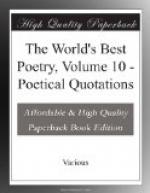“We believe that poetry, far from injuring society, is one of the great instruments of its refinement and exaltation. It lifts the mind above ordinary life, gives it a respite from depressing cares, and awakens the consciousness of its affinity with what is pure and noble. In its legitimate and highest efforts it has the same tendency and aim with Christianity,—that is, to spiritualize our nature.... The present life, which is the first stage of the immortal mind, abounds in the materials of poetry, and it is the highest office of the bard, to detect this divine element among the grosser pleasures and labors of our earthly being. The present life is not wholly prosaic, precise, tame, and finite. To the gifted eye it abounds in the poetic....
“It is not true that the poet paints a life which does not exist. He only extracts and concentrates, as it were, life’s ethereal essence, arrests and condenses its volatile fragrance, brings together its scattered beauties, and prolongs its more refined but evanescent joys: and in this he does well; for it is good to feel that life is not wholly usurped by cares for subsistence and physical gratifications, but admits, in measures which may be indefinitely enlarged, sentiments and delights worthy of a higher being.”
In his Introduction to the “Plymouth Collection of Hymns and Tunes”—the pioneer book of all such aids to church congregational singing—Henry Ward Beecher gave a noble view of the power of a hymn arising out of experience:
“No other composition is like an experimental hymn. It is not a mere poetic impulse. It is not a thought, a fancy, a feeling threaded upon words. It is the voice of experience speaking from the soul a few words that condense and often represent a whole life....
“One great hope may come to fruit only at the end of many years, and as the ripening of a hundred experiences. As there be flowers that drink the dews of spring and summer, and feed upon all the rains, and only just before the winter comes burst forth into bloom, so it is with some of the noblest blossoms of the soul. The bolt that prostrated Saul gave him the exceeding brightness of Christ; and so some hymns could never have been written but for a heart-stroke that well-nigh crushed out the life. It is cleft in two by bereavement, and out of the rift comes forth, as by resurrection, the form and voice that shall never die out of the world. Angels sat at the grave’s mouth; and so hymns are the angels that rise up out of our griefs and darkness and dismay.
“Thus born, a hymn is one of those silent ministers which God sends to those who are to be heirs of salvation. It enters into the tender imagination of childhood, and casts down upon the chambers of its thought a holy radiance which shall never quite depart. It goes with the Christian, singing to him all the way, as if it were the airy voice of some guardian spirit. When darkness of trouble, settling fast, is shutting out every star, a hymn bursts through and brings light like a torch. It abides by our side in sickness. It goes forth with us in joy to syllable that joy.




